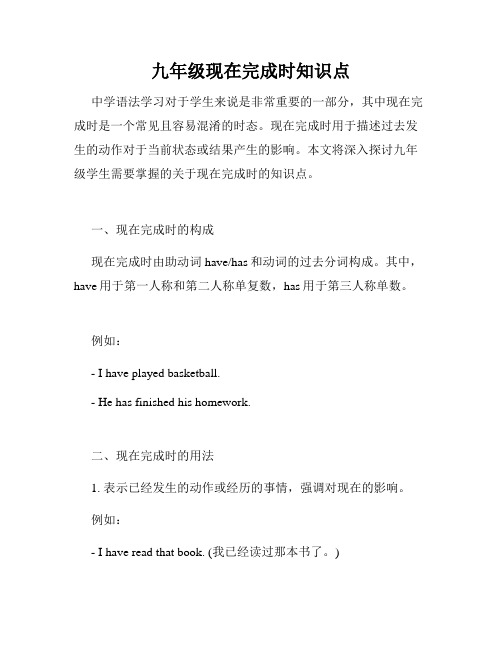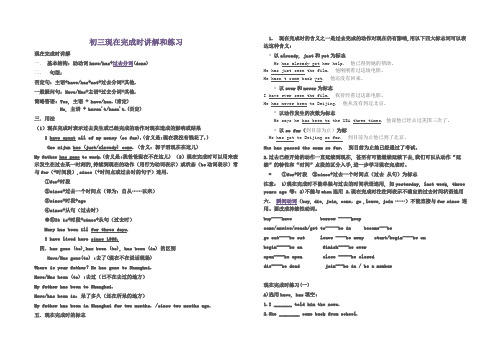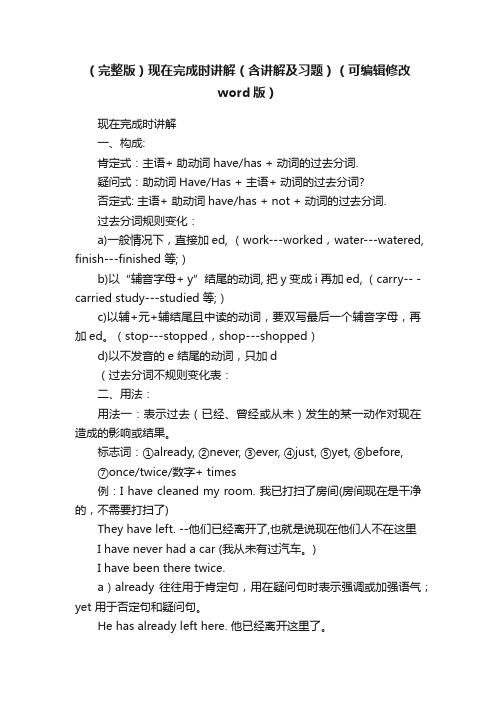2017九年级现在完成时讲解
现在完成时讲解课件

1
2
现在完成时的主要用法
表示过去发生的某一动作对现在造成的影响或结果。
表示过去已经开始, 持续到现在的动作或状态,
表示人曾有过或到目前为止从未有过的经历
现在完成时的主要用法
现在完成时的运用(1): 在表示“用法1”时,现在完成时常和副词already, yet, never, ever ,before ,just等连用。
Eg. I haven’t had breakfast yet. Have you had breakfast yet?
否定句:句末 “还(没)”
yet在现在完成时中的用法
疑问句: 句末 “己经”
b) never 是否定词,表示“从来没有”,而ever 表示“曾经”
We have never been to the Great Wall. 我们从来没有去过长城。 Have you ever been to Canada? 你们曾经去过加拿大吗?
4. I __________ (read) the novel twice. It’s interesting. 5. She _________(go) to Pairs, hasn’t she? Yes. How ______ she _______(go) there? She _______(go) there by air. 6. So far, many countries _______________(develop) their software programs. 7.Mr Chen ______(give)up smoking last year. 8.Mr Chen __________(give) up smoking since last year.
初中现在完成时讲解ppt

• 在以上两种用法中常跟already, not…yet, never, just, before, ever, recently等
时间继续下去的状语。
• 3) 表示过去已经开始, 持续到现在, 也 许还会继续下去的动作或状态,常与包 括现在在内的一段时间的状语连用。
动词填空:
1._H_a__v_eyou _c_l_e_a_n_e_d_(clean) the room? Yes, we_h_a__v_e_d__o_n_e(do) that already. When __d_id____ you __d_o___(do) it? We __d_id____(do) it an hour ago.
2._H__a_s__ he _s_e__e_n_(see) this film yet? Yes. When _d_i_d__ he s_e__e__(see) it? He __s_a_w__ it last week.
3. How many times _h_a_v_e_you_c_o__m__e(come) here?
练习题:
1.It's a long time since we _m_e_t_ (meet) last, isn't i
t?
2.--I know youh_a_v__e__c_h_o_s_e_n(choose) a picture book amon
g these.
--Yes,Have a look at it, please.
现在完成时的否定形式: have not (haven’t) +过去分词 has not (hasn’t) +过去分词
初三英语《现在完成时》PPT课件

What has happened to the USA in the last 350 years?
注意点一: 现在完成时与一般过去时的用法比较 现在完成时表示过去的动作一直延续到现在甚至会继续下去或表示 过去的动作对现在造成的影响;一般过去时表示动作发生的时间在 过去。现在完成时属于现在时态范围,因此,不能和表示过去的时 间状语连用。 如:yesterday, last night, two weeks ago等 试比较: The plane has arrived . 飞机已经来了。(说明现在的情况:飞机 在这儿) The plane arrived a quarter ago. 飞机是一刻中以前来的。(强 调动作发生的时间在过去) I have taught here for fifteen years. 我在这儿已经教了十五年。 (表示十五年前的动作一直延续到现在,还可能会继续。) I taught here for a year. 我过去在这儿教过一年。(表示“我“现 在已经不在这儿任教了)
((√×))
He has joined the League member for two years. ( ×)
√ He has been a League member for two years. ( )
他已入团两年了。
The man has been dead for several years. The man has died for several years. 这个人已经死了几年了。
练习:用have(has) been 或have(has) gone 填空 A: Where __1__ Li Fei __1__? B: He __2__ to Hainan Island. A: How long __3__ he __3___ there? B: He ___4__ there for three days. A: When will he come back , do you know? B: I’m afraid he won’t come back recently. A: Could you tell me the way to Hainan Island? B: Sorry, I __5__ never __5__ there. A: How many times __6__ Li Fei __6___ to that place? B: He __7__ there only once.
九年级现在完成时知识点

九年级现在完成时知识点中学语法学习对于学生来说是非常重要的一部分,其中现在完成时是一个常见且容易混淆的时态。
现在完成时用于描述过去发生的动作对于当前状态或结果产生的影响。
本文将深入探讨九年级学生需要掌握的关于现在完成时的知识点。
一、现在完成时的构成现在完成时由助动词have/has和动词的过去分词构成。
其中,have用于第一人称和第二人称单复数,has用于第三人称单数。
例如:- I have played basketball.- He has finished his homework.二、现在完成时的用法1. 表示已经发生的动作或经历的事情,强调对现在的影响。
例如:- I have read that book. (我已经读过那本书了。
)- She has gone to the store. (她已经去商店了。
)2. 表示过去发生的动作对当前状态或结果产生的影响。
例如:- They have studied hard, so they know a lot. (他们学习很努力,所以他们知道很多。
)- He has traveled around the world, so he has a broad perspective. (他环游了世界,所以他有广泛的视野。
)3. 表示从过去某个时间点开始一直延续到现在的动作。
例如:- She has lived in this city for five years. (她在这个城市已经住了五年了。
)- We have known each other since childhood. (我们从小就认识彼此。
)三、现在完成时的信号词1. already - 已经- Have you finished your homework already? (你已经做完作业了吗?)2. just - 刚刚- She has just arrived. (她刚到。
初三现在完成时

初三现在完成时讲解和练习现在完成时讲解一.基本结构:助动词have/has+过去分词(done)二.句型:否定句:主语+have/has+not+过去分词+其他.一般疑问句:Have/Has+主语+过去分词+其他.简略答语: Yes,主语+ have/has.(肯定)No,主语+ haven't/hasn't.(否定)三.用法(1)现在完成时表示过去发生或已经完成的动作对现在造成的影响或结果I have spent all of my money (so far).(含义是:现在我没有钱花了.)Guo zijun has (just/already) come. (含义:郭子君现在在这儿)My father has gone to work.(含义是:我爸爸现在不在这儿)(2)现在完成时可以用来表示发生在过去某一时刻的,持续到现在的动作(用行为动词表示)或状态(be动词表示)常与for(+时间段),since(+时间点或过去时的句子)连用.①for+时段②since+过去一个时间点(译为:自从……以来)③since+时段+ago④since+从句(过去时)●⑤It is+时段+since+从句(过去时)Mary has been ill for three days.I have lived here since 1998.四.has gone (to),has been (to), has been (in)的区别Have/Has gone(to) :去了(现在不在说话现场)Where is your father?He has gone to Shanghai.Have/Has been (to) :去过(已不在去过的地方)My father has been to Shanghai.Have/has been in:呆了多久(还在所呆的地方)My father has been in Shanghai for two months. /since two months ago.五.现在完成时的标志1. 现在完成时的含义之一是过去完成的动作对现在仍有影响,用以下四大标志词可以表达这种含义:* 以already, just和yet为标志He has already got her help. 他已得到她的帮助。
2016-2017学年度九年级英语Unit 13 知识点总结(新目标人教版)

2016-2017学年度九年级英语Unit 13 知识点总结(新目标人教版)九年级英语Unit13《e’re tring t save the earth!》知识点1现在进行时定义:表示说话时(瞬间)正在进行的动作,也表示目前或现阶段一直进行的动作。
结构: ①肯定句: 主语+ a/is/are + V-ing②否定句: 主语+ a/is/are + nt + V-ing③疑问句: A/Is/Are + 主语+ V-ing用法:1)表示说话时正在进行的,目前正在发生的动作。
①L! The big bird is fling aa ②He is athing a vie n2)表示目前一段时间内正在进行,但说话时可能没有进行的动作。
Right n I a studing hinese b distane learning 我现在正通过远程教育学习汉语。
1) 2)常带有表示目前时刻的时间副词, 如:n, right n, at the (ver) ent, fr the tie being, at present, these das 及L! Listen!3)与alas, nstantl, frever, all the tie等副词连用,表示动作反复或习惯。
此时句子常含有说话者的强烈情感在内。
表达较强的“责备”或“表扬”之意①u are alas hanging ur ind 你总是主意不定。
(太烦人了)②He is alas helping thers他总是帮助别人。
(他真是个好人)4)对于e, g, leave, arrive, start, fl, drive等表示位置移动的动词常可用进行时态表将。
①He is leaving n ednesda②ar isn’t here at the ent She is ing later2 used t d过去常常做某事见第四单元及use用法be/get used t ding 习惯于做某事be used t d=be used fr ding 被用做某事3 被动语态见第五单元注意:接双宾语的词的被动语态;ae /let /have sb d的被动语态;see/ hear /ntie /find /bserve/ntie sb d 的被动语态;It’s said/reprted/believed/suppsed/ell-nn that;及无被动语态的三种情况(感官动词、不及物动词、sell/rite等)4 现在完成时:用法:①过去发生的动作对现在造成的影响或结果:强调结果esterda I finished her, that’s t sa, I have finished her n②过去已经开始一直持续到现在的动作或状态:强调继续I have lived here sine 1990现在完成时的构成have/has+过去分词现在完成时的四个基本句型肯定句He has finished the r一般疑问句Has he finished the r?否定句He has nt finished the r两回答es ,he has N, he hasn’t特殊疑问句hat has he dne?在下列情形下用现在完成时1九词语①alread 已经肯定句中或句尾I have alread fund pen = I have fund pen alread②et已经否定句和疑问句句尾I have nt finished the r etHave u bught a puter et?③ever曾经句中Have u ever seen pandas?④never从不句中I have never been t Beiing⑤ust刚刚句中I have ust dne r⑥befre以前句尾I have never been there befre⑦s far到目前为止S far he has learned 200 rds⑧h lng多久H lng have u lived here?⑨h an ties多少次H an ties has he been t Beiing?2两词组have<has>gne t去了某地例:He has gne t Beiing (去了北京,没回)have<has>been t去过某地例:He has been t Beiing (去过北京,回了)3两结构fr t nths fr +一段时间i has lived here fr 2 nthssine last earsine +过去时间点Lu has been in Beiing sine 3 ears agsine 3 ears agsine 1990sine he ae heresine +过去时态句子He has been in hina sine he ae here4如果句子里面没有时间状语,汉语意思能够加“已经”,往往用现在完成时态。
现在完成时ppt课件

过去完成时由“had+过去分词”构成,而现在完成时由 “have/has+过去分词”构成。
动作的完成情况不同
过去完成时表示动作在过去某一时间之前已经完成,而现在完成时 则表示动作在过去发生后对现在造成了影响或结果。
PART 05
现在完成时的常见错误
REPORTING
忽略现在完成时的使用场合
PART 03
现在完成时的特殊用法
REPORTING
与already连用的用法
总结词
already是现在完成时的常用副词之一,用于表达某件事情已经完成或已经发 生。
详细描述
在现在完成时中,already通常用于肯定句中,表示某件事情已经完成或已经发 生,常与have或has连用。例如,“I have already finished my homework.”(我已经完成了我的作业)。
总结词
不重视现在完成时的应用场景
详细描述
有些英语学习者在运用现在完成时的时候, 不注意它所适用的场合。现在完成时主要用 来描述过去发生的动作或状态对现在造成的 影响或结果,比如:“I have finished my homework”(我已经完成了我的作业)。
混淆现在完成时与一般过去时的使用场合
现在完成时ppt课件
REPORTING
• 现在完成时的定义和构成 • 现在完成时的基本用法 • 现在完成时的特殊用法 • 现在完成时与一般过去时的区别 • 现在完成时的常见错误 • 现在完成时练习题及答案解析
目录
PART 01
现在完成时的定义和构成
REPORTING
现在完成时的定义
现在完成时是英语语法中的一种时态 ,通常由助动词have/has + 过去分 词构成,用于描述过去发生的动作或 状态对现在产生的影响或结果。
(完整版)现在完成时讲解(含讲解及习题)(可编辑修改word版)

(完整版)现在完成时讲解(含讲解及习题)(可编辑修改word版)现在完成时讲解一、构成:肯定式:主语+ 助动词have/has + 动词的过去分词.疑问式:助动词Have/Has + 主语+ 动词的过去分词?否定式: 主语+ 助动词have/has + not + 动词的过去分词.过去分词规则变化:a)一般情况下,直接加ed, (work---worked,water---watered, finish---finished 等;)b)以“辅音字母+ y”结尾的动词, 把y 变成i 再加ed, (carry-- -carried study---studied 等;)c)以辅+元+辅结尾且中读的动词,要双写最后一个辅音字母,再加ed。
(stop---stopped,shop---shopped)d)以不发音的e 结尾的动词,只加d(过去分词不规则变化表:二、用法:用法一:表示过去(已经、曾经或从未)发生的某一动作对现在造成的影响或结果。
标志词:①already, ②never, ③ever, ④just, ⑤yet, ⑥before,⑦once/twice/数字+ times例:I have cleaned my room. 我已打扫了房间(房间现在是干净的,不需要打扫了)They have left. --他们已经离开了,也就是说现在他们人不在这里I have never had a car (我从未有过汽车。
)I have been there twice.a)already 往往用于肯定句,用在疑问句时表示强调或加强语气;yet 用于否定句和疑问句。
He has already left here. 他已经离开这里了。
Has he already left here? 他(真的)已经离开这里了吗?(表示加强语气)My teachers haven’t had breakfast yet. 我的老师们还没有吃早饭。
- 1、下载文档前请自行甄别文档内容的完整性,平台不提供额外的编辑、内容补充、找答案等附加服务。
- 2、"仅部分预览"的文档,不可在线预览部分如存在完整性等问题,可反馈申请退款(可完整预览的文档不适用该条件!)。
- 3、如文档侵犯您的权益,请联系客服反馈,我们会尽快为您处理(人工客服工作时间:9:00-18:30)。
现在完成时讲解及训练一.现在完成时:表示过去已经发生或已经完成的某一动作对现在造成的影响或结果。
即“过去的动作 + 现在的结果”,强调结果。
如: I have bought a new bike. (= I bought a new bike, and I have a ne w bike now.)我已经买了一辆新的自行车。
(强调我现在有了一辆新车。
)构成形式:助动词have / has + 动词的过去分词1.肯定句: I have seen the film. 我已经看过这部电影。
否定句: I haven’t seen the film. 我没看过这部电影。
一般疑问句: Have you seen the film? 你看过这部电影了吗?回答: Yes, I have. 是的,我看过了。
No, I haven’t. 不,我没看过。
特殊疑问句: What have you done? 你已经做了什么?2.肯定句: He has finished the task. 他已经完成了任务。
否定句: He finished the task. 他还没有完成任务。
一般疑问句:the task? 他已经完成任务了吗?回答:是的,他完成了。
不,他没有完成。
特殊疑问句: What has he finished? 他完成了什么?[Exercises 1] 选择填空( )1.I English in this school since 1999 .(A)taught (B)have taught (C)teach (D)would teach ( )2.Lilei the pen for five years(A)has had (B)bought (C)have had (D)have bought( )3.Kate her grand mother's photo before(A)haven't seen (B)have seen (C)see (D)hasn't seen ( )4. Mary you these days?(A)Has,seen (B)Do,see (C)Did,see (D)Is,seeing ( )5.so far ,we thousands of Building in Quanzhou.(A)build (B)have build (C)build (D)will build [Exercises 2] 选择填空( )6.——Have you finished your work?—— .(A) Yes, I have. (B) Yes, I do. (C) Yes, I am. (D) Yes, I did. ( )7.——Has she ever learned English?—— .(A) Yes, she has. (B) Yes, she does.(C) No, she doesn’t (D)No, she has( )8.He finished his homework yet .(A)doesn’t (B)haven’t (C) hasn’t (D) doesn’t have二.have/ has been to, have/ has gone to和have/has been in①have/ has been to + 某地,到过某地,说话时人已经回来了。
②have /has gone to + 某地,说明去了某地,说话时人还没回来。
如:I have been to Beijing twice. 他去过北京两次。
---- Where is Jim? 吉姆在哪儿?---- He has gone to the library? 他去图书馆了。
③have/has been in 表示“在某地呆多长时间”,常与表示一段时间的状语连用,如:since, for, how long 等如: Mr. Brown has been in Shanghai for three days. [Exercises 7]A)用have(has) been 或have(has) gone 填空。
A: Where ____________ Li Fei ___________?B: He ____________ to Hainan Island.A: How long ___________ he ___________ there?B: He _____________ there for three days.A: When will he come back , do you know?B: I’m afraid he won’t come back recently.A: Could you tell me the way to Hainan Island?B: Sorry, I _________ never ___________ there.A: How many times ___________ Li Fei __________ to that place? B: He _____________ there only once.B)用have/has been to/in, have gone to的各种形式填空。
1) Where is Jack? He __________ his country.2) David ________ the park just now.3) John _______ England since he came back.4) How long _____ have _____ this village?5) The Smiths ______ Beijing for years.6) _____ you ever ____ America? -- Yes, I _____ there many times.7) I _____ this school since three years ago.8) Where is Jim? He _____ the farm.C)选择填空( )1.Mrs whites isn't here,she London,she there many times .(A)has been to , went (B)has gone to , has been(C)went to, has gone (D)has been to , has gone( )2.She has__________ to Beijing twice .(A)gone (B) got (C)been (D)come( )3.——where your father , Li Lei? ——To Beijing (A)have,been (B)has,been (C)have,gone (D)has,gone ( )4.Mr Green isn't in the office , He to the library (A)has gone (B)went (C)has been (D)will go( )5.Mr smith to Tokyo and he will be back in a week .(A)has been (B)has visited (C)has sent (D)has gone ( )6.They_ China for two years(A) have been to (B)have been in(C)have gone to (D)have come to三.常用于现在完成时的时间状语:already, just , yet, ever, never, recently.1.already 和 yetalready “已经”(多用于肯定陈述句)yet “已经; 还”(用于否定句或疑问句)2.ever 和 neverever “曾经”(多用于疑问句,问初次经历)never“从未;从来不”(多用于否定陈述句),常回答ever的句型。
3.justjust “刚刚”(多用于肯定句,位于谓语动词之前)4.beforebefore “之前”(一般位于句末;常与never呼应),如: He says he has never seen such beautiful scenery before.他说他以前从来没看过这么美的风景。
e.g. 1. I have just called you.2. ——Have you ever been to France?——No, I’ve never been to any European countries.3. ——Have you seen him yet?——Yes, I have seen him already.[Exercises 3] 选择填空( )1.——Have you travelled on the train?——Yes, I have.(A) never (B)ever (C)just (D)yet( )2.——Have you finished your homework ?——Not .(A)ever (B)already (C)yet (D)just( )3. We haven't finished our homework .(A)already (B)ever (C)yet (D)never( )4.——Have you learned English?——Yes, I've learned a lot.(A) never,ever (B)ever,never (C)ever,already (D)already.ever( )5.——Have you finihed your homework ?——Yes,I've done that(A) yet,already (B)already, yet (C)ever,never (D)still,just ( )6.John's father borrowed some pictures .(A)have , already (B)has , just(C)have, ever (D)has , yet四.现在完成时: 常与for或since引导的时间状语连用,表示从过去某一时刻延续到现在。
注意:句中谓语动词要用延续性动词一段时间的表达方法有两种:a)“for + 时间段”与“since + 时间点”都表“一段时间”,常用How long 提问。
